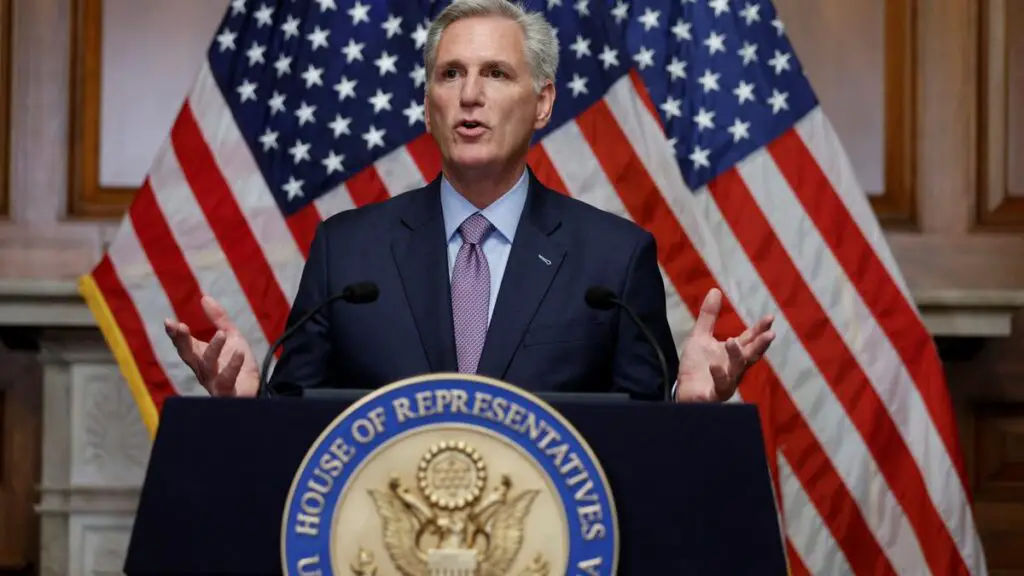Former Speaker Kevin McCarthy Ousted from Senior Position
Former Speaker of the House Kevin McCarthy (R-CA) speaks to reporters after he was ousted from the position of Speaker by a vote of the House of Representatives at the U.S. Capitol in Washington, U.S, on October 3. | Photo Credit: Reuters
Photo Credit: Reuters
The U.S. House of Representatives Speaker, Republican Kevin McCarthy, has been ousted from his senior position in the lower chamber of Congress by hardliners within his party. This brings to an end the saga of Mr. McCarthy’s rise within the Republican Party and reveals deep fault lines across it, between those that support former U.S. President Donald Trump and those who adhere to a more traditional vision of political conservativism. While Mr. McCarthy’s ambitions have effectively been nullified by this development the episode could have a knock-on effect in terms of Republican prospects for the 2024 presidential election.
How did the ouster happen?
If Kevin McCarthy’s ascension to the role of House Speaker was any indication of the resistance to his leadership among the ranks of the Republican Party, his ouster, unprecedented in U.S. history for a Speaker, on Tuesday, would truly not have been a surprise. Close on the heels of the narrow victory of the Republican Party in the House in the November 2022 mid-term election, California Congressman McCarthy waged a dogged campaign to be anointed Speaker, against daunting odds. At the time, it was already evident that he faced a deeply divided congressional conservative caucus — it took no less than a whopping 15 voting rounds before he could claim the Speaker’s gavel.
A factor beyond the boundaries of the House that adversely impacted his leadership prospects at the time was the Democratic Party’s control of the Senate and White House. This placed him in a politically uncomfortable position of choosing between the Scylla of criticism for being a moderate and making deals with Democrats to get the work of the House done, and the Charybdis of dangerous pandering to the extremist House acolytes of Mr. Trump.
Perhaps sensing his positional weakness, Florida Republican and Trump supporter Matt Gaetz relied on a “rarely used procedural tool known as a motion to vacate” to abruptly end Mr. McCarthy’s tenure as Speaker. It is ironic that Mr. McCarthy was, in the end, undone by the very clause that he had conceded to House Republican hardliners as part of the deal to win over their support for his Speaker campaign — an agreement that it would be permissible for a single member of the lower chamber to put forward a motion to remove him from the top post in the House. In the final reckoning, despite winning the backing of 210 Republicans, Mr. McCarthy was defeated by 216 votes — including eight Republicans and all the House Democrats — and had to vacate his position as Speaker of the Republican majority House.
Why was his leadership in question?
While, on the one hand, his ouster may appear to be a fraught leadership contest within the House Republican caucus that has exposed unsavory factionalism, at a deeper level, it reflects the divide between Republicans who would go to great lengths to back Mr. Trump, despite the 45th President facing three criminal indictments with several more likely along the way. For example, the Republican Freedom Caucus, which has played a role in foiling Mr. McCarthy’s first campaign for the post of Speaker in 2015, viewed with suspicion the former Speaker’s successful negotiation with Democrats to help avoid a U.S. federal government shutdown last weekend.
Similarly, although Mr. McCarthy has staunchly denied it, Mr. Gaetz has alleged that Mr. McCarthy made a “secret side deal” with President Joe Biden, a Democrat, to supply even more funding to Ukraine. Ironically, it was Mr. McCarthy who, around the time of his campaign to gain the Speaker’s gavel earlier this year, vowed to end the purported “blank check” that the U.S. had given Ukraine in support of its efforts to repel the Russian invasion of its territories. This likely reflects the extent to which Mr. McCarthy had felt torn between making public pronouncements in favor of the loud clamors of the Trump campaign and the need to quietly work in a bipartisan manner to get House bills passed into law.

